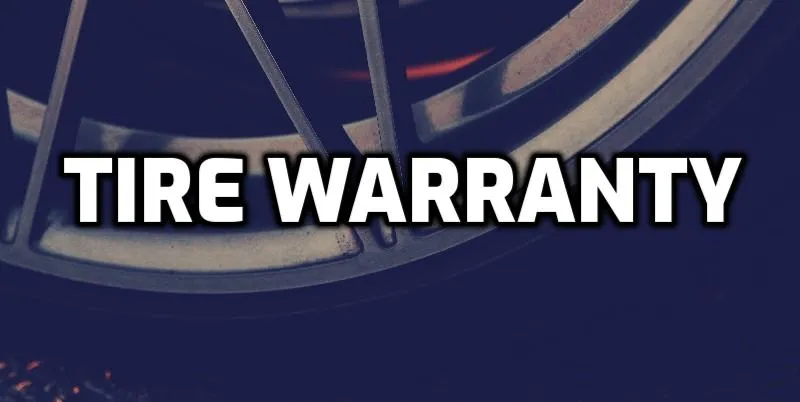How Do Tire Warranties Work?

Tires are among the most crucial parts that we buy to utilize our vehicle. It is expected that these tires regularly will last up to 1 year or at least to their advertised lifespan. But more often, they tend to expire out of wear off and the road debris is the one responsible. A spare tire can only offer a short time solution. But then the tire has to be repaired, and it will be proven useful to know if there is a warranty to meet the cost.
Uneven roads often lead to premature expiration of our tires due to excessive friction and mechanical wear off. The resistant layer of rubber gets rusted and falls off the tire leaving a skeleton figured tire no longer of use. That’s why most of the tires come with a warranty to spare the full cost the consumers have to pay each time they plan to buy a new tire.
Lifespan of Tires
No doubts we expect a lot from our vehicle tires. We expect them to take us to places with the maximum comfort, support our weight, provide safety even in the harshest of road conditions, and spare us from the unfriendly weather conditions. But disappointing our expectations they sometimes give up pretty early. This is where the tire warranty may provide us with some relief.
Tire manufacturers offer a few various types of warranties that might suit your situation. Here is a short description to keep in mind to sort out the best out of all these offered tire warranties-
Mileage Warranty
Usually, these tires are known to cover four, five or even six years of service if you are fortunate enough. The uniqueness of these tires is that they guarantee a particular number of miles that you will be provided with before they wear out of overuse. Suppose the tire fails to deliver that certain mileage that’s been promised. In that case, the manufacturer may give you a re-fund considering the differences between the delivered miles and the promised number of miles.
To be eligible for the claim like such under this kind of scenario, the tires have worn evenly through the whole diameter and must be down to the final 2/32nds of tread. To have your application approved, you will have to prove that the tires were rotated regularly and accordingly with the help of the manufacturer’s recommendation. But there are some exceptional cases too where mileage warranties are not applicable. Off-road tires with high performances, mostly winter tires, don’t come with this warranty. Best things I can suggest you that you can compare (255 75r17 vs 265 70r17 Tire) the tire mileage here.
Limited Road Hazard Warranty
Not all companies come with this warranty, yet some offer a limited road hazard warranty typically estimated to cover for the year after the purchase or the first 2/32nds of tread life. Usually, whichever occurs first is prioritized. This kind of warranty will cover any damage caused by the road conditions, such as potholes, poor draining system and others.
The tire must be unrepairable in case you are looking forward to claiming this warranty. Meet this single demand, and you are free to this service.
Uniformity Warranty
The warranty is applied over a very rare occurrence, which is excessive vibration or rides disturbance. This particular sort of warranty is applicable within the first year of purchase and can easily be detected as soon as the tire is installed and driven on. Since this is a very rare issue, most manufacturers only approve one or two out of the complete set. An authorized code is needed from the company if you want to claim more tires under this warranty.
Trial periods or Test drives
There are still manufacturing companies that permit the buyer for a test drive. The duration can last up to 30-45 days. The agenda is if you are not happy with the tires or they don’t seem to meet your expectations, you can return them. But the manufacturer will present a new set of tires if you are willing to buy them. Most of them will require you to exchange the tires from the test periods for a new set from the production stock lineup to get qualified.
How to Tell the Age of a Tire?
When it comes to determining the actual age of a tire, all you have to do is look for the Tire Identification Number, also titled the “tire’s serial number”. It may look a bit tricky, but unlike vehicle identification, the Tire Identification Number (TIN) is the batch code of the week and year of its creation.
The department of transportation of the U.S. (DOT) states that the identification number will be delivered as a code. A combination of letters and numbers following the range of eight to thirteen numerical numbers and letters. These marks will refer to the manufacturing location, determine tire size and manufacturer’s code with the adhesive week and year of the certain tire produced.
Closure
Feels like too much to remember? If so then hold on to your sales receipt. Most tire manufacturing companies offer their tires for four years from the date they had been purchased or five years from the week the wheels were produced. So as long as you have the receipt in your hands, you are pretty well aware of the convenience you are left to have when it comes to tire warranties.
Frequently Asked Questions (FAQ)
There are a few things that are not covered by tire warranties. These include:
-Damage from road hazards such as nails, glass, or potholes
-Misuse orabuse, such as using tires on a track or off-road
-Normal wear and tear
-Cosmetic damage, such as scrapes or scratches
If you have any questions about what is covered by your tire warranty, be sure to contact the manufacturer or your local tire retailer.
